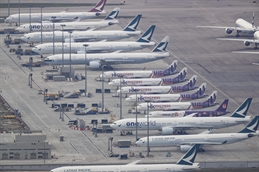
A new report released by Everstream Analytics noted that as of November 30, at least 70 countries in Europe, the Americas, Africa and the Middle East, and Asia have imposed travel restrictions from several countries in southern Africa where a new COVID-19 variant named Omicron was first discovered.
But in addition to the arrival of the new variant, it said that this reaction brings "multiple supply chain challenges" and implications including potential drop in air cargo capacity on key trade lanes, a continuance of elevated freight spot rates, and lack of personnel to keep the supply chain operations running.
"The World Health Organization has warned that a new COVID-19 variant named Omicron poses a high global risk. Despite significant questions remaining about the transmissibility of the variant and the severity of its effects, dozens of countries have started to implement new restrictions since November 26, including border closures and travel bans," it said, noting that several countries have identified cases of the highly mutated variant, including Canada, Japan, Spain, and Germany.
In total, at least 17 countries and territories have now confirmed Omicron cases.
"To slow the coronavirus variant’s spread, at least 70 countries in Europe, the Americas, Africa and the Middle East, and Asia have imposed travel restrictions from several countries in southern Africa where it was first discovered. Most countries and trading blocs such as the United States, the European Union, and the United Kingdom, have been targeting travelers from South Africa, Botswana, Eswatini, Lesotho, Mozambique, Namibia, Malawi, Angola, Zambia, and Zimbabwe," it added.
Additionally, it said Israel, Morocco, and Japan have announced an entry ban for all foreign visitors, while Morocco has halted all incoming flights for two weeks.
It noted that while Delta Air Lines and United Airlines have yet to modify any schedules, their European counterparts, including British Airways, Air France, and Virgin Atlantic Airways, have started to cancel flights out of South Africa since November 26. Meanwhile, Singapore Airlines has converted some passenger services to South Africa into cargo-only flights over the weekend.
Freighter and 'preighter' flights again?
"A strong contingent of freighter operators has maintained routes to and from southern Africa, and other airlines may decide to turn passenger aircraft into cargo-only flights. Despite this, air cargo capacity is expected to decrease by 30% over the next few days, particularly on the key trade lanes between South Africa and North America, Europe, and Asia," Everstream said.
"Due to continuous strong demand, spot rates are likely to significantly increase until the end of the year amid the peak shipping season."
It added that beyond air cargo connections to and from southern Africa, new quarantine measures for flight crews elsewhere could also lead to significantly reduced spot cargo availability in the coming weeks.
Similar to the Delta variant over the past summer, the new Omicron variant could also exacerbate the current labor shortage and supply chain woes as workers at logistics and manufacturing facilities could temporarily exit the workforce or be deterred from returning.
Delayed supply chain recovery
"Were labor shortages to become more severe, congestion issues affecting ports from Los Angeles to Savannah and Felixstowe could continue even longer into 2022, delaying the normalization period of ocean supply chains, initially anticipated to happen sometime after the Chinese Lunar New Year in February 2022," Everstream said.
It added that with container freight spot rates remaining stable throughout November, the new variant also has the potential to keep rates at an elevated level before an anticipated correction sometime in 2022.



